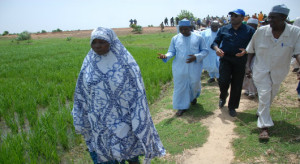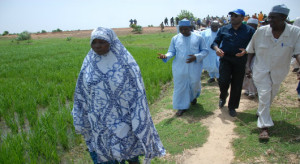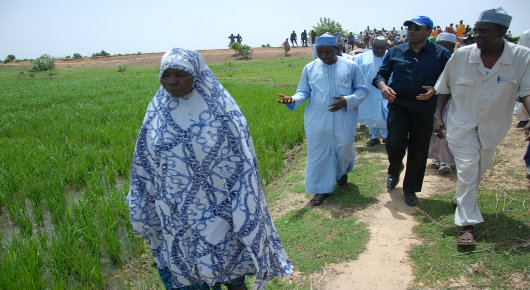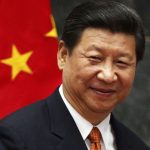The Reality of Rice Revolution in Nigeria And Why We Must Cheer
Agriculture, Articles/Opinion Sunday, October 27th, 2013
The African Examiner
Four decades of Nigeria’s food balance sheet history were filled with rhetorics, regrets and rots arising from a decline in local food production profile while the food import bill was on the rise. The vulnerability of Nigeria’s economy during this time was heightened by consumer’s behaviours, public policy inconsistencies premised on insensitivity to grave implications of dependence on food importation and the attendant loss occasioned by capital flight due to foreign exchange outflows expended to make up for local production deficits.
 Nigerians seem either unaware or non-challant on the health, security and economic implications of such importation. Foremost, no exporting country will keep old stocks in store while exporting fresh harvests. As such, the first-in first-out principle of stocking food applies, wherein such nations push out stocks of five years and above as exports, while retaining new harvests. The health implication to importing nations can be better imagined, especially when the quality of old stocks may have deteriorated, or when we consider the impact of storage chemicals on consumers, where such chemicals are used, or when the nutritional values have deteriorated due to long years of storage.Rice, a food commodity, initially occasionally consumed by households, mostly ceremonially, soon became a daily household staple, a first choice at public gatherings and a common food item in our growing fast food outlets. What governments and individual consumers have failed to reckon with, over the years, was the insidious destruction the growing appetite for rice has caused to Nigeria’s economy, especially when two-third of the rice consumed is imported.
Nigerians seem either unaware or non-challant on the health, security and economic implications of such importation. Foremost, no exporting country will keep old stocks in store while exporting fresh harvests. As such, the first-in first-out principle of stocking food applies, wherein such nations push out stocks of five years and above as exports, while retaining new harvests. The health implication to importing nations can be better imagined, especially when the quality of old stocks may have deteriorated, or when we consider the impact of storage chemicals on consumers, where such chemicals are used, or when the nutritional values have deteriorated due to long years of storage.Rice, a food commodity, initially occasionally consumed by households, mostly ceremonially, soon became a daily household staple, a first choice at public gatherings and a common food item in our growing fast food outlets. What governments and individual consumers have failed to reckon with, over the years, was the insidious destruction the growing appetite for rice has caused to Nigeria’s economy, especially when two-third of the rice consumed is imported.
Secondly, the security of any food-importing nation is questionable due to the vulnerability associated with economic and environmental shocks, shortage of supplies and deprivation of local farming population who become jobless and constitute social threat to their own country. The economic implication, not only derives from the security (social) implication, but also complicates it. What is gain to the exporting nation is a commensurate loss to the importing nation. This needs some elaboration.
The annual foreign exchange outflow goes to enrich the producer and exporter nations. Farmers in importing nations are deprived of incentives to produce in a competitive way. Thus, a vibrant farming population is discouraged and displaced from farming. The economic shock is further compounded by the absence of viable alternative employments for the displaced.
The diagnosis of the importation conundrum is a worthwhile exercise if we really must appreciate the level of damage that has done to our national psyche and the need to move out of the quagmire we have found ourselves in for 40 years. Importation is a major reason why agriculture and agribusiness became unattractive to Nigerian investors – small, medium or large scale. Import licences, tariff waivers, and other import-related incentives became a part of government’s annual policies to the detriment of the economy.
To the discerning, an annual expenditure of $11 billion on food importation is alarming enough, with rice importation alone constituting about N365 billion ($2.4 billion or one-fifth of total annual food import bill) annually, meaning that nearly N1 billion has been spent daily for rice importation for so many years. For how long then can we, as a country, afford to tie our food needs to importation, with a population growing at a geometrical rate? At what point should we stop, ponder and change the rising and seemingly irreversible but undesirable trend that is digging a big hole in our national treasury?
Under the Transformation Agenda of the Goodluck Jonathan administration, a hard look was cast at this and it was decided that Nigeria, as a nation, cannot afford to continue to toe this line ever so blindly. This paved the way for the rice transformation agenda, an intervention that led – within the past two years – to a massive reduction in Nigeria’s dependence on rice importation. The flood of 2012 became a blessing in disguise as it served as a springboard for possibility thinking, involving the inputs of local and international experts assembled by the Minister of Agriculture to think through on how to produce massively to make up for whatever food shortage was occasioned by the flood.
Ten states of northern Nigeria were systematically and methodically selected for the dry season incentivised irrigated rice production, a project that committed 264,000 hectares of farmland to dry season rice production, yielding about 1.1 million metric tons of rice within five months, keeping the farmers busy at a time of the year they were traditionally idle, and putting more money into their pockets. The experiment arising from the flood of last year, has led to a policy direction of entrenching the dry season rice farming into Nigeria’s agricultural calendar, now to do massive production in twenty states, going forward.
The dry season intervention, being the first of such an attempt, arose out of the panic scenario that was painted by many economic analysts after the flood. It was an emergency response then, with limited time to plan and execute, a chosen line of decision, taken instead of succumbing to self-serving suggestions coming from traders who would rather that Nigeria imported food to make up for perceived losses arising from the flood. If ten states, on an experimental and emergency basis (as it were), could produce about a third of what is yearly imported, and done in response to a disaster, then let us think of what more states would produce under a deliberately planned and systematically implemented programme.
It is too premature for any pundit in the comfort of an office to cast aspersion on the agricultural transformation programme implemented in rural communities simply because it has not done a magic, or because its results are not felt everywhere yet. The confounding variables in agriculture are more complex, more complicated and more far-reaching in implications than in other sectors.
Let us think about it: we are talking about agriculture, operating under harsh logistic environment, supporting resource-poor farmers, tilling the ground, reaching farming population in remote areas, dealing with unpredictable weather, building trust, persuading the financial institutions to play in the sector they hitherto avoided and regarded as risk-prone, and restoring confidence in doubting farming population who have been used to years of deceit from previous governments, government interventions and government officials.
The journey to make Nigeria a global powerhouse in food production is ongoing. The results achieved in just two years give a signal of progress and a cause to cheer. The flood plains of River Niger, just outside Lokoja, have been there for years, unutilised, until Governor Idris Wada of Kogi State, working with the Federal Goverment’s team, turned the area to a massive rice-growing field during the past dry season. Governor Wada described rice as one crop where a lot of money could be made within three months, based on his experience this last dry season. He is there to attest to this reality.
China’s agricultural growth is impressive and offers lessons for Nigeria as it pulled over 400 million people out of poverty within ten years, largely through the transformation of the agricultural sector. China understands that nothing is more important than food and treats it as a matter of national security.
One of China’s most impressive technologies is the super hybrid rice developed by Professor Yuan Long Pin, reputed to give yields up to 15 tons per hectare. Our Minister of Agriculture, Dr. Akin Adesina, had a discussion with Professor Long Pin in Beijing in July this year on how Nigeria could benefit from this technology. Nigeria has established relations with the Chinese institutions to access this new rice technology as part of our national drive for domestic rice self-sufficiency.
Large-scale commercial rice producers are already expanding their production of rice locally. Fourteen large-scale integrated rice mills have been established by the private sector in just two years, producing international quality long-grained parboiled rice. Arising from the recent dry season rice production, local large-scale millers now have access to locally-produced raw paddy as could be attested to in Bakolori scheme in Zamfara State, Argungu plains in Kebbi, Wamakko or Tambuwal local governments in Sokoto State, the Eko Rice, coming from Kebbi paddy fields in Suru, exposing the futility of requests for waivers to import rice, which President Jonathan turned down.
Taraba is another state worth mentioning, wherein a single investor, working with a cluster of out-growers, embarked on large-scale rice production on 30,000 hectares. Working with state indigenes, Dominion Rice Farm is embarking on what promises to bridge about 15 per cent of imported rice through a local production. Taraba is thus fast becoming a major rice hub for Nigeria in response to the policy incentives arising from the transformation agenda of the federal government. Olam, another private firm, is expanding its rice cultivation by 6, 000 hectares for the same reason. And just last month, a Nigerian investor commissioned Quarra Rice in Kwara State, a mill with capacity of 30,000 metric tons per annum, with commercial rice farms on thousands of hectares.
The rice transformation agenda is not only aimed at boosting production but also at embarking on market interventions. Guaranteed minimum price mechanisms are becoming operational in rice-producing states, working with the state governments, to encourage the farmers to remain in profitable business of rice production. This takes off the unexpected price shocks that have largely decimated the farming population in the production of various agricultural commodities all over the country. To further build the resilience of our food system, the government has completed a total of 10 new silos for strategic food reserves within one year, expanding Nigeria’s silo capacity by 400 per cent. These silos are now being provided under concessions to the private sector, for the establishment of world-class agricultural commodity exchanges.
Times have changed. Considering the dynamics in Nigerian agriculture, especially in the past two years, the jinx has been broken. Nigeria will soon be free from rice imports and will produce, not just enough for local consumption, but will have excess to store and even export! Nigerians need to be patient and see the positive side of the changes taking place on the fields, translating to improved rural economies, rising volume of locally-produced rice stock and freeing our economy from the stranglehold of decades of import-dependency.
Nigerians are getting to know better and appreciate the paradigm shift that is unlocking the potential of Nigeria’s agriculture as the Minister of Agriculture has fought what was perhaps the most incipient corruption that has been entrenched in the rice sector. The nation is arising from the ashes of decades of neglect of its agriculture sector. That is worth cheering about.
Related Posts
Short URL: https://www.africanexaminer.com/?p=3789























